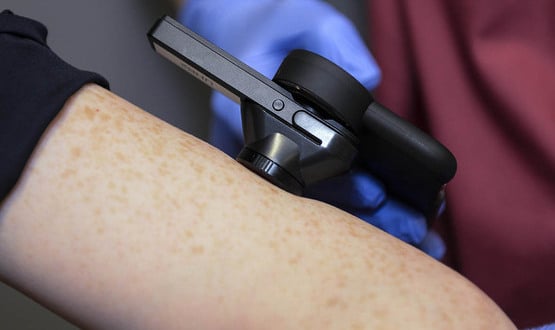Skin Analytics’ DERM technology revolutionising skin cancer care
- 20 June 2023

Teledermatology is playing a key role in the fight against skin cancer, with the NHS recently announcing that it will invest in and accelerate the rollout of it to use within the urgent two-week-wait skin cancer pathway and suspected cancer referrals.
Artificial intelligence (AI) technology from start-up company Skin Analytics, called DERM (Deep Ensemble for the Recognition of Malignancy), is leading the battle against skin cancer in seven NHS trusts, with plans for further rollout.
Company CEO Neil Daly speaks exclusively to Digital Health News about DERM and its results, benefits and challenges, the rollout across the NHS and his hopes and aspirations for the future.
DERM and its positive results
DERM is a UKCA Class IIa AI as a Medical Device (AIaMD) that assesses dermoscopic images of skin lesions for skin cancer.
The NHS’ investment in teledermatology for two-week-wait referrals or suspected cancer referrals requires the use of a dermoscopic lens, Daly explained, to capture a high quality image of a skin lesion and is what a dermatologist would use in a face to face examination.
“Teledermatology allows you to drive some efficiency as our specialists can spend time with the information they need, rather than spending time to capture that information. However, on it’s own it’s not enough to address the mismatch between demand and supply in dermatology,” he said.
“So that’s where our AIaMD comes in. Effectively DERM can play a similar role to a dermatologist but from a perspective of triaging a patient. It can identify the malignant lesions and make sure they’re prioritised to be reviewed or seen face to face with a dermatologist.”
The results of DERM have been positive, with Skin Analytics’ most recent quarterly performance review showing that the AI tool found 99% of the cancers seen while identifying 76% of benign lesions assessed.
A boost for clinicians
Daly believes DERM has key benefits for clinicians in both primary and secondary care. In primary care, with the system flooded by cancer referrals in dermatology, Skin Analytics’ technology “will alleviate some of the pressure felt in primary care to be more expert in skin cancer”.
In second care, Daly claims “the benefit of DERM is mostly down to helping manage that huge volume of work that’s overwhelming departments around the country”.
In addition, the technology will allow clinicians to spend more time with people with chronic skin conditions, something clinicians cannot currently do. This is because of the need to prioritise finding cancer because of the mortality rate, which is “a huge frustration to dermatologists”, Daly told Digital Health News.
Not without its challenges
Despite the many benefits of technology like DERM, it comes with its challenges. “The first challenge is that it takes a long time to develop technologies in safety critical industries,” Daly said.
“So we started over ten years ago and launched after seven years, which is a long time. But there is a lot to do around clinical validation and regulations after you finish the research.”
Daly highlighted other challenges, most notably clinicians’ scepticism about AI, and the need to take them along the journey and provide evidence that patients will get the right outcomes.
Wider rollout and future ambitions
DERM is currently live in seven NHS trusts with a further six at various stages of deployment, Daly confirmed.
“We’re planning to launch another ten by the end of this year as announced by the NHS last week. The goal of course is to scale this across the NHS next year and ensure that every patient has access to it.”
Daly has a clear ambition, which he has held since he first set up Skin Analytics in 2012. “My company when I set it up, it was to make sure that no one died from skin cancer. That’s why everyone that comes to work in our company gets really excited about trying to do that,” he said.
He confirmed that the company’s mid- to long-term goal is to show that AI is strong enough to make skin cancer assessments that are really easy to access, so people can just walk into an NHS site and have a skin check whenever they are worried, without having to book ahead and worry about whether there is capacity to have a GP appointment.
In terms of other exciting projects on the horizon for Skin Analytics, Daly told Digital Health News that the company “has an ambition to work more broadly across dermatology” as there is a very large need to also augment care around psoriasis, eczema and a range of other inflammatory skin conditions.
“We’ve started having lots of conversations around other areas where we can take all the learnings that we’ve built up and really try to accelerate the use and adoption of AI within those other areas,” Daly added.
“We haven’t made any moves yet, we’re having lots of conversations and with some luck, some of those will come together and we’ll expand out.”




